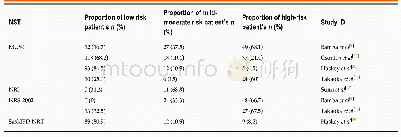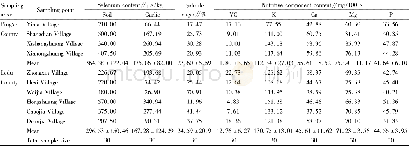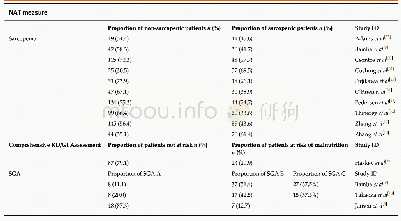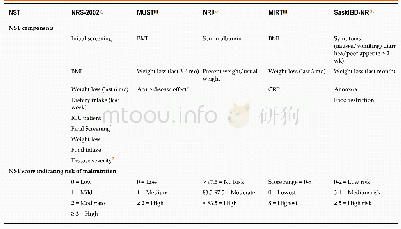《Table 4 Proportion of nutrition abnormalities via nutrition screening tools》
 提示:宽带有限、当前游客访问压缩模式
提示:宽带有限、当前游客访问压缩模式
本系列图表出处文件名:随高清版一同展现
《Systematic review of nutrition screening and assessment in inflammatory bowel disease》
In conclusion,our study has summarized the currently available evidence for NSTs/NATs in the IBD population.Although some studies support the association of NSTs/NATs with specific clinical outcomes,the heterogeneity in study design,lack of data from large cohorts,and lack of comprehensive validation of existing NSTs,does not translate into the recommendation of a single optimal NST or NAT at this time.The high prevalence of malnutrition seen across these recent studies reaffirms the ongoing significance of malnutrition in the IBD population and the need to utilize appropriate NST/NATs.Consistent with guideline recommendations,nutrition screening should be conducted on every patient with IBD both at diagnosis and at least annually,with more frequent measures as needed[18].Referral should be made to a RD to patients at moderate or high risk of malnutrition for more definitive assessment.The strengths and limitations of the tools have been highlighted in this review.Going forward,clinically relevant research areas include larger scale studies evaluating the assessment of alternate measures of sarcopenia,the development and validation of novel NSTs/NATs,such as the MIRT/SaskIBD-NRT and an assessment of the responsiveness of the tools to measure change with a nutrition intervention.Based on the promising data from these tools,the optimal NST/NAT for the IBD population is likely to be one that takes into account the unique dietary habits and chronic inflammatory nature of this population.It is encouraging to note that the majority of articles included within this review have been published within the last 2years.We anticipate that continued activity and interest will lead to the development and validation of tools in concert with clinical care pathways,embedding the important processes of nutrition screening and assessment within routine IBD clinic visits.
| 图表编号 | XD0087249000 严禁用于非法目的 |
|---|---|
| 绘制时间 | 2019.07.28 |
| 作者 | Suqing Li、Michael Ney、Tannaz Eslamparast、Ben Vandermeer、Kathleen P Ismond、Karen Kroeker、Brendan Halloran、Maitreyi Raman、Puneeta Tandon |
| 绘制单位 | Division of Internal Medicine, Department of Medicine, Faculty of Medicine and Dentistry, University of Alberta、Division of Gastroenterology and Hepatology, Department of Medicine, University of Calgary、Cirrhosis Care Clinic, Division of Gastroenterology, |
| 更多格式 | 高清、无水印(增值服务) |
查看“Table 4 Proportion of nutrition abnormalities via nutrition screening tools”的人还看了
-

- Table 2Effect of C.dichotoma extract on nutritional parameters in rats fed high-fat diet for 4 weeks.





